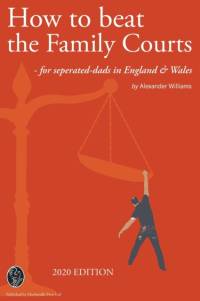Om How to beat the Family Courts
Alexander Williams has been a McKenzie Friend in the Family Courts for the last eighteen years. How to Beat the Family Courts encapsulates his advice, mostly directed at men, on coping with the well-known bias found in the processes of law used to sort out disputes over child arrangements following a couple's separation or divorce. This is the PRINT-ON-DEMAND version of the book. Distributed and wholesaled by Gardner Books, printed via Ingram Lightning Source. The stated intention of this book is clear and unapologetic: to help men who just want to be fathers. What the book does not cover are: financial disputes, property settlements, Public Law action by social services, advise on divorce proceedings, or anything to do with newly defined parenthood resulting from medical intervention or same-sex marriages. The topic of discussion is 'child arrangements orders' made in the Lower Family Courts of England and Wales. As Family Courts in Scotland and Northern Ireland have different practices as well as different laws, especially in Scotland, most of this work does not apply in those countries.When read as a self-help guide for 'litigants in person, ' chapters of the book standalone as advice for men in different personal and financial circumstances. Yet, this work is more than just a legal guide for Private Law litigants. It is also a commentary on the state of Family Law in Great Britain at the start of the 21st Century. For the author is determined we don't lose the history of how countless fathers and their children have already suffered from discrimination at the hands of our Family Court Judges. While some may be alarmed at what he writes, others will find illuminating Williams' examination and explanations of the politics and intrigues surrounding the making of, and the execution of, Family Law. On this you are guaranteed a read that doesn't pull its punches.While the text has been checked by practising solicitors, the publisher cautions that reading this book is not intended to replace any of the other good support available to parents estranged from their children; be that books by lawyers, or assistance from parent support organisations, online forums or lobbyists. Both the author and publisher warn that reading this volume is not the same as getting legal advice, nor does it replace expert assistance in settling disputes about child arrangements following divorce or separation. However, what this book can do is to provide some experience-based glue around all of these different forms of help.
Visa mer

